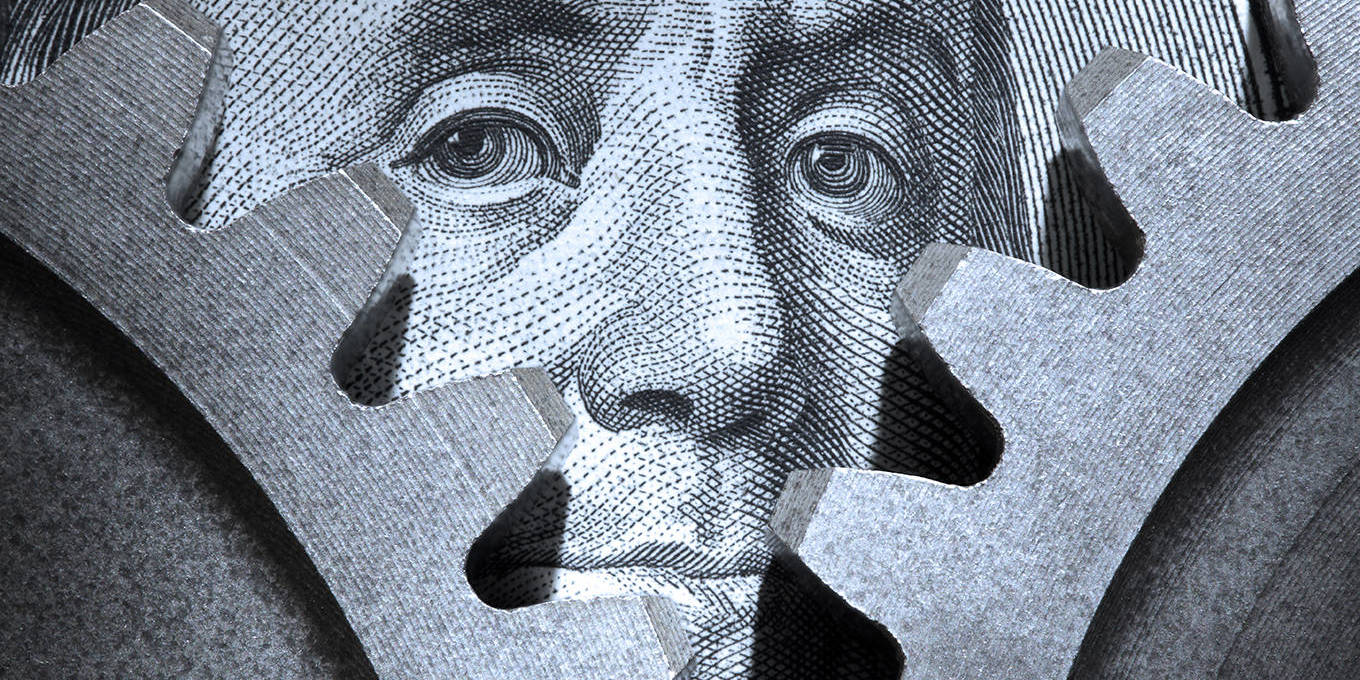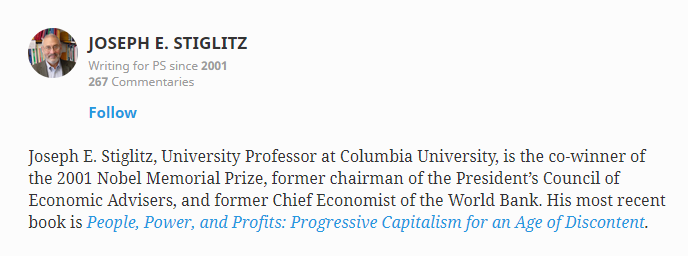Welcome to DU!
The truly grassroots left-of-center political community where regular people, not algorithms, drive the discussions and set the standards.
Join the community:
Create a free account
Support DU (and get rid of ads!):
Become a Star Member
Latest Breaking News
Editorials & Other Articles
General Discussion
The DU Lounge
All Forums
Issue Forums
Culture Forums
Alliance Forums
Region Forums
Support Forums
Help & Search
General Discussion
Showing Original Post only (View all)Joseph Stiglitz : The end of neoliberalism and the rebirth of history [View all]
For 40 years, elites in rich and poor countries alike promised that neoliberal policies would lead to faster economic growth, and that the benefits would trickle down so that everyone, including the poorest, would be better off. Now that the evidence is in, is it any wonder that trust in elites and confidence in democracy have plummeted?https://www.project-syndicate.org/commentary/end-of-neoliberalism-unfettered-markets-fail-by-joseph-e-stiglitz-2019-11

At the end of the Cold War, the political scientist Francis Fukuyama wrote a celebrated essay called ‘The end of history?’. Communism’s collapse, he argued, would clear the last obstacle separating the entire world from its destiny of liberal democracy and market economies. Many people agreed. Today, as we face a retreat from the rules-based, liberal global order, with autocratic rulers and demagogues leading countries that contain well over half the world’s population, Fukuyama’s idea seems quaint and naive. But it reinforced the neoliberal economic doctrine that has prevailed for the last 40 years. The credibility of neoliberalism’s faith in unfettered markets as the surest road to shared prosperity is on life-support these days. And well it should be. The simultaneous waning of confidence in neoliberalism and in democracy is no coincidence or mere correlation. Neoliberalism has undermined democracy for 40 years.
Out of control
The form of globalisation prescribed by neoliberalism left individuals and entire societies unable to control an important part of their own destiny, as Dani Rodrik of Harvard University has explained so clearly, and as I argue in my recent books Globalization and Its Discontents Revisited and People, Power, and Profits. The effects of capital-market liberalisation were particularly odious: if a leading presidential candidate in an emerging market lost favour with Wall Street, the banks would pull their money out of the country. Voters then faced a stark choice: give in to Wall Street or face a severe financial crisis. It was as if Wall Street had more political power than the country’s citizens. Even in rich countries, ordinary citizens were told, ‘You can’t pursue the policies you want’—whether adequate social protection, decent wages, progressive taxation or a well-regulated financial system—‘because the country will lose competitiveness, jobs will disappear, and you will suffer’.
In rich and poor countries alike, elites promised that neoliberal policies would lead to faster economic growth, and that the benefits would trickle down so that everyone, including the poorest, would be better off. To get there, though, workers would have to accept lower wages, and all citizens would have to accept cutbacks in important government programs. The elites claimed that their promises were based on scientific economic models and “evidence-based research.” Well, after 40 years, the numbers are in: growth has slowed, and the fruits of that growth went overwhelmingly to a very few at the top. As wages stagnated and the stock market soared, income and wealth flowed up, rather than trickling down. How can wage restraint – to attain or maintain competitiveness – and reduced government programs possibly add up to higher standards of living? Ordinary citizens felt like they had been sold a bill of goods. They were right to feel conned.
We are now experiencing the political consequences of this grand deception: distrust of the elites, of the economic “science” on which neoliberalism was based, and of the money-corrupted political system that made it all possible. The reality is that, despite its name, the era of neoliberalism was far from liberal. It imposed an intellectual orthodoxy whose guardians were utterly intolerant of dissent. Economists with heterodox views were treated as heretics to be shunned, or at best shunted off to a few isolated institutions. Neoliberalism bore little resemblance to the “open society” that Karl Popper had advocated. As George Soros has emphasized, Popper recognized that our society is a complex, ever-evolving system in which the more we learn, the more our knowledge changes the behavior of the system.
snip

129 replies
 = new reply since forum marked as read
Highlight:
NoneDon't highlight anything
5 newestHighlight 5 most recent replies
= new reply since forum marked as read
Highlight:
NoneDon't highlight anything
5 newestHighlight 5 most recent replies
Joseph Stiglitz : The end of neoliberalism and the rebirth of history [View all]
Celerity
Nov 2019
OP
I agree with you, and I have the bad habit of not reading other people's posts b4 posting mine
Perseus
Nov 2019
#5
being right handed is 'human nature' but we don't have to do everything right handed
certainot
Nov 2019
#75
trump 'ascended' mainly for two reasons - the 'left's' ignorance of talk radio, russian use of it
certainot
Nov 2019
#84
That stood out first thing as well, democracy is seriously at risk. Americans
appalachiablue
Nov 2019
#26
I liked your post, and believe CEO salaries and definitely bonuses should be capped.
PatrickforO
Nov 2019
#9
The neo-liberal corporate narrative pervades the news media that is owned by... corporations
Eyeball_Kid
Nov 2019
#12
Never forget that both Jeffrey Sachs and Joseph Stiglitz supported neo-liberalism
malaise
Nov 2019
#22
We were the idiots that voted for the idiots that lowered the top tax rate!
FiveGoodMen
Nov 2019
#42
Top Tax Rate On Income - They Grow Their Wealth By Buying Appreciating Assets And Never Pay
DanieRains
Nov 2019
#49
So, one measure, suicide? That's it? More children are going to bed satiated..
X_Digger
Nov 2019
#39
Statistics and people say Anmericans are struggling regardless of your personal shots
Bradshaw3
Nov 2019
#88
Telling a person that their focus is demonstrably myopic is a personal attack?
X_Digger
Nov 2019
#91
I'm not being US centric, thanks. But your bias is showing through, loud & clear. n/t
X_Digger
Dec 2019
#117
Are there counter stats that say that deaths from war are increasing over time? hunger?
X_Digger
Nov 2019
#60
Hunger is growing, homelessness is growing, infant mortality is growing, illiteracy is growing...
Doremus
Nov 2019
#67
If you look at the long tail, yes, hunger is variable. Nothing like it was, even in 2003, or 1993.
X_Digger
Nov 2019
#61
I think perspective is important. Pull your nose up out of the weeds sometimes. n/t
X_Digger
Dec 2019
#124
I'm very politically aware, so how have I completely missed 40 years of this?
CaptainTruth
Nov 2019
#48
hopefully this helps, I would be happy to deal with any remaining questions after this
Celerity
Nov 2019
#51
it has actual definitions, and different permutations, to only dismiss it as a smear is disingenuous
Celerity
Nov 2019
#57
simply not true, there are multiple forms of neoliberalism, and it is simply an attempt to stifle
Celerity
Dec 2019
#104
Elites blah blah blah neoliberals both sides Wall Street Democrats bad, university professor sez.
betsuni
Nov 2019
#78
I think you need to re-read Stiglitz's bio, he is not just some 'university professor'
Celerity
Dec 2019
#105
Ridiculous, and he was Bill Clinton's chief economist, a Cabinet member, was 2nd in command
Celerity
Dec 2019
#109
When Democratic presidents have to deal with Republican majorities in the legislature,
betsuni
Dec 2019
#110
you are injecting something that had nothing to do with the discussion into this
Celerity
Dec 2019
#111